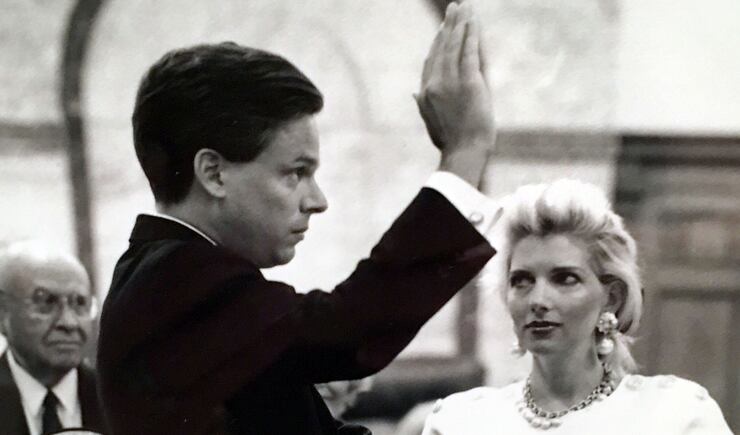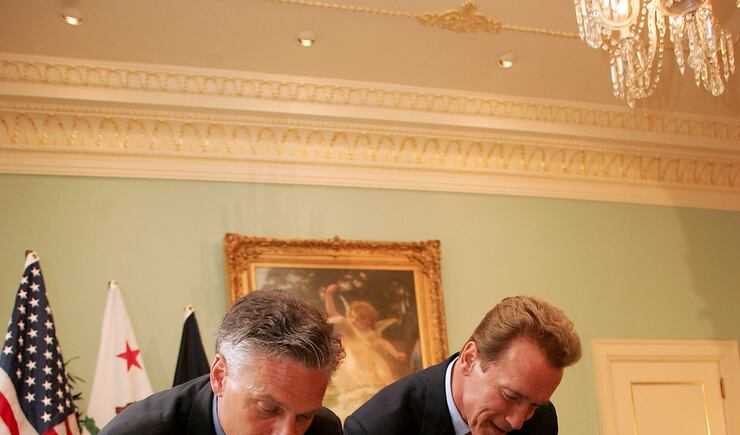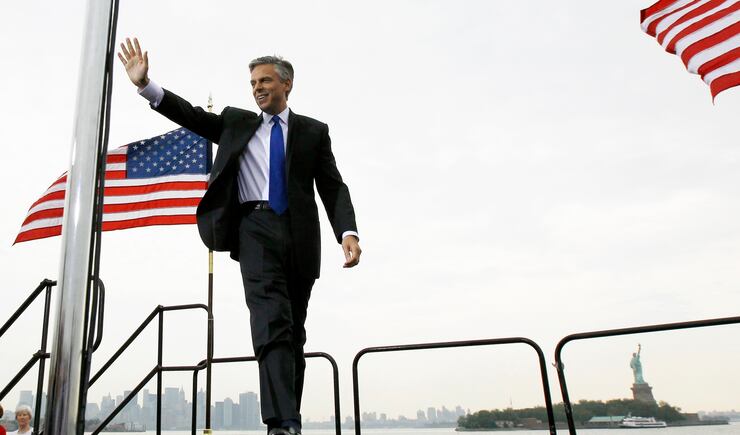CEDAR CITY — Jon Huntsman Jr. formally announced Thursday he’s running for a third term as Utah’s governor, hoping to return to the office he left a decade ago to serve as U.S. ambassador to China, later running for president and eventually joining the Trump administration as the nation’s top diplomat in Russia.
“We are here to say that we are so very honored and humbled to announce my candidacy for governor of the greatest state in America,” Huntsman said in a brief early-morning interview on KSL Newsradio from his Cedar City hotel room. He called his run “an outgrowth of our commitment to public service.”
Huntsman is scheduled to deliver his first speech as a candidate at noon, on “Utah and the World” at Southern Utah University’s Leavitt Center for Politics and Public Service, named for another former governor, Mike Leavitt, then meet with reporters.
“We are at an inflection point. It’s almost like the growth cycle that we’re now in will not last forever. We’re going to have to make some tough choices,” he told the radio station, citing competition for jobs not just from surrounding states but the world.
“I think we left a legacy of strong growth, re-branding the state and getting us in a good direction,” Huntsman said, praising Gov. Gary Herbert, his former lieutenant governor who took over when he resigned in 2009 and is not seeking reelection, as “a great man and a great public servant.”
Huntsman joins a so far solely Republican field of candidates in the 2020 race that already includes Lt. Gov. Spencer Cox, businessman Jeff Burningham and Salt Lake County Councilwoman Aimee Winder Newton, with former Utah House Speaker Greg Hughes, former Utah GOP Chairman Thomas Wright, and retiring U.S. Rep. Rob Bishop among those looking at a run.
Why return for a run in Utah?
Thursday’s announcement ends months of speculation about a Huntsman candidacy. But it also brings into focus a key question: Why would Huntsman, 59, and seen as still harboring ambitions to become U.S. secretary of state, want to run for governor again?
“That’s a darned good question. I mean, to me, I have to say it’s a little bit of a mystery because, again, he’s done that. He’s been successful,” University of Utah political science professor Matthew Burbank said. “In all honesty, I’m a little surprised he wants to come back because it seems like he has his sights set on something bigger.”








That’s what Chris Karpowitz, co-director of Brigham Young University’s Center for the Study of Elections and Democracy, wonders about, too.
“What are Jon Huntsman’s ambitions exactly? Is this meant to be a place where he can bide his time until more national opportunities open up, either with a new administration or for his own run for office at the national level again? Or is this a way to kind of wind down those national ambitions?” Karpowitz asked.
Voters want to know if Huntsman is prepared to stay put if he’s elected again, the professors said.
Derek Miller, managing director of the Governor’s Office of Economic Development under Huntsman and now Salt Lake Chamber president and CEO, said that’s a valid question.
But the answer shouldn’t be “disqualifying in any way. In fact, just the opposite. Someone who has the desire to serve at something is to be admired and applauded,” Miller said, calling it “very likely” that Huntsman would be a serious contender for secretary of state no matter who wins the 2020 presidential election.
“My experience with Gov. Huntsman is that he loves to serve. He cares about the country and he cares about the state,” Miller said. “With that sort of background and with those sort of credentials and that sort of desire, who wouldn’t want to serve as secretary of state?”
He said voters likely would be satisfied with Huntsman, saying that because of his experience since leaving office, he’s “seen what is out there on the international stage, the good, the bad,” along with the role there is for Utah in the larger world.
“Most Utahns that I know have a view that Utah does have a role to play on the world stage,” Miller said. “I think that answer will resonate with the view we have of our state.”
A place to ‘get something done’
Former Connecticut Sen. Joe Lieberman, the 2000 Democratic vice presidential nominee who served as a co-chairman with Huntsman of No Labels, a national organization formed a decade ago to end partisanship in the nation’s capital, told the Deseret News he doesn’t see Huntsman heading back to Washington anytime soon.
“Part of it is, Utah is home to him,” Lieberman said, and states are still a place where a governor can bring people together, unlike a Washington that’s been “diminished by ideologies.” He said he personally was encouraged by Huntsman’s choice to run again for governor.
Lieberman, who counts Huntsman as a close friend after getting to know him when both backed the late Arizona Sen. John McCain’s 2008 presidential bid, said Huntsman doesn’t see the race “as a way to put another medal on his chest. He’s looking for a way to get something done.”
Ryan Clancy, a Brooklyn-based senior adviser to No Labels, said Huntsman “has embodied this ideal of putting your country over party. On the one hand, he is a committed conservative. On the other hand, he knows that in no area of life do you ever get everything you want. ... Getting anything done means working with the other side.”
He said running a state is in contrast to Washington’s “endless circus, which is often very disconnected with the things that people care about. When you’re the governor, you can make the schools better. You can make the roads better. You can do things that have a measurable impact in people’s lives.”
Whether being governor again would position Huntsman to be considered for another high-level federal post remains to be seen.
“I don’t know that being governor of Utah is necessarily much of an enhancement,” said Matthew Wilson, a political science professor at Southern Methodist University in Texas. “He already has that sort of political experience in his background, so there’s kind of the ‘been there, done that’ factor to it.”
Wilson, who studies the role of religion in politics, said the shift in the GOP under Trump “really locks out moderate establishment Republican figures like Huntsman” from running for president, limiting his political aspirations to the state level.
But Huntsman has “worked to maintain himself in the good graces of President Trump,” possibly aligning himself to be chosen secretary of state in the future, Wilson said. However, should a Democrat win the White House, he said such a significant appointment “is probably wishful thinking.”
There may be another explanation for Huntsman’s decision to run for governor again, Wilson said.
“Maybe he feels like he’s ready to just return to Utah and wants to live out his career in public service,” the Texas professor said. “That may be all there is to it. We always have the tendency to imagine people have their eye on a bigger prize.”
Huntsman has had other federal posts, including as U.S. ambassador to Singapore, before first being elected governor in 2004. He easily won reelection in 2008 with nearly 78% of the vote, but stepped down less than a year into his second term after Democratic President Barack Obama named him U.S. ambassador to China.
After two years in Beijing, Huntsman returned to launch a short-lived 2012 bid for president that ended after a disappointing third-place finish in New Hampshire, behind now Utah Sen. Mitt Romney, the eventual Republican nominee, and Ron Paul, then a Texas congressman.
He then held high-profile positions with the Atlantic Council, a Washington, D.C.-based foreign policy think tank along, with his stint at the No Labels organization and at the Huntsman Cancer Institute in Salt Lake City, founded by his late father.
After Trump won the White House in 2016, Huntsman, as well as Romney, was considered for secretary of state but the post went to oil company executive Rex Tillerson. Huntsman was selected ambassador to Russia, serving in Moscow during heightened tensions between the two nations over Russian interference in U.S. elections.
Impact on the governor’s race
Just weeks after his return to Utah, Huntsman enters the race with advantages over the other candidates. A recent poll for the Salt Lake Chamber had Huntsman as the favorite among a list of candidates for governor, with 33% of all likely voters saying they’d choose him if the election were today.
Miller said the poll results, which also gave Huntsman higher favorability ratings than any other Utah political figure, speaks to the lasting impact of his accomplishments as governor a decade ago, particularly when it came to economic development and what was the state’s last sweeping tax reform effort.
Huntsman came across to voters then “as somebody who cared a lot about our state, and was willing to make personal sacrifices in order to serve in public office,” Miller said, and his running again for governor would “shake up the race significantly, I think, Day 1 ... you can’t understate how it’s going to shake up the race.”
Others aren’t so sure.
Karpowitz said it’s not clear how voters will view Huntsman’s absence from the state, especially in what could be a crowded Republican primary. Since Huntsman left, elections have changed to allow candidates to get on a primary ballot by gathering voter signatures, bypassing the traditional party caucus and convention system.
Utah State University political science professor Damon Cann said Romney, a former Massachusetts governor who lived in Utah while running the 2002 Winter Olympics, faced pushback from some Republican voters when he was forced into a Senate primary against a little-known state lawmaker.
“Romney’s task was a little easier,” Cann said. “I think Huntsman will have to navigate this more carefully than did Romney simply because the field of challengers is deeper in this election. We’ve seen the skepticism from Utahns before,” Cann said, but for Huntsman, “it feels like it could be a little harder to overcome.”










